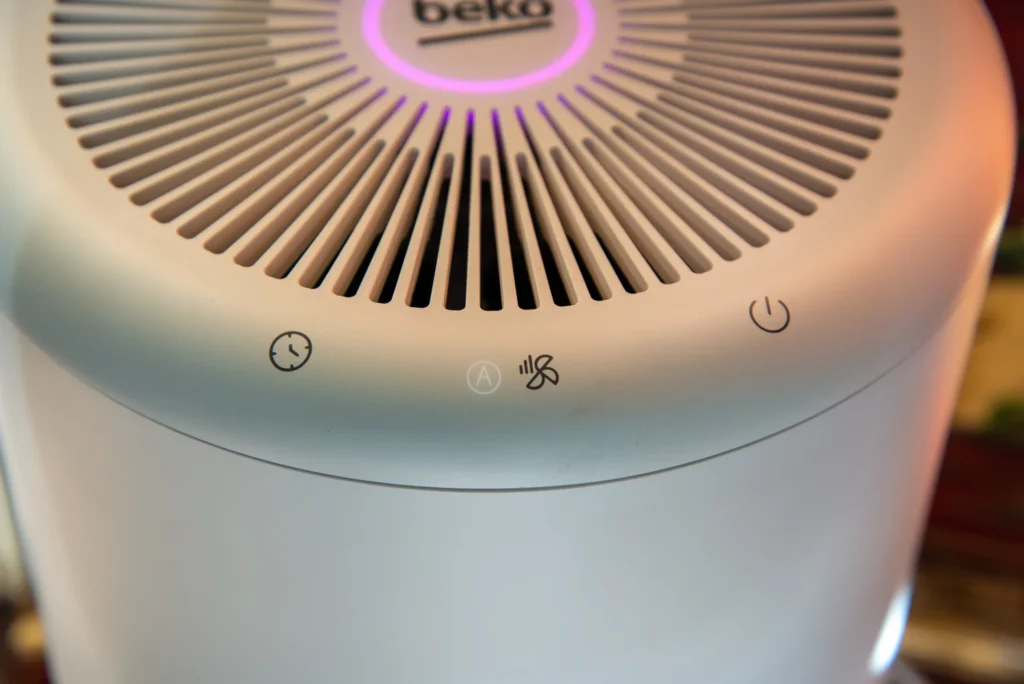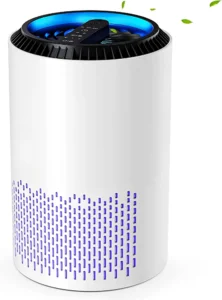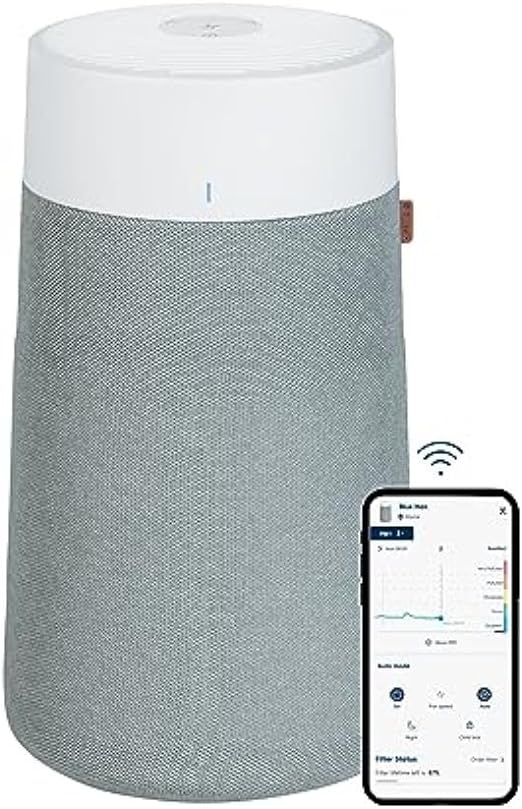With the increasing concern of worsening air pollution, it is more important than ever to breathe high-quality air. Indoor air can contain 2 to 5 times more pollutants when compared to outdoor air. An air purifier’s job is to filter out contaminants from the air and recirculate clean air. It can be confusing when buying your first air purifier as there are many different brands with various price points, you may be wondering what is the best least expensive air purifier.
Breathing clean air should not be taken for granted as it can massively improve our quality of life by improving cognitive function, breathing, and sleep, and helping relieve allergies and asthma.
This article will delve into some of the benefits of air purifiers, the considerations when it comes to purchasing an air purifier, and a recommendation of some products based on personal experience and research.
Table of contents
Why are air purifiers good?
Air purifiers aim to clean the air we breathe of nasty pollutants. Many air purifiers with HEPA filters remove 99.7% of pollutants from the air. Improving our air quality can provide the following benefits:
- Improve asthma & allergies: Asthma is more common than you’d think, one in every 12 adults and one in every 11 children have asthma. Removing the amount of pet dander, pollen, and dust mites from the air you breathe will mean less irritation to your body.
- Combat airborne diseases: Infectious bacteria and viruses can live in the air we breathe. Air purifiers can capture these bacteria and viruses, reducing our risk of becoming infected.
- improved sleep: With less congestion and irritation of our respiratory system, we should sleep better. Stuffy noses, coughing, sneezing, and sore throats are sure ways to disrupt our quality of sleep. Attaining high-quality sleep is vital for improving our resilience to stress and increasing our productivity.
- Removes odors: Air purifiers can remove unwanted smells by trapping particles indoors. Unwanted smells from smoke, food, and sweat can be a thing of the past with a good air purifier.
The quality of what we put into our bodies affects what we get out, and this applies to water, food, and air. It’s easy to forget such basic things. Consciously aiming to increase the quality of these inputs can make a tremendous impact on our lives.

Do non-expensive air purifiers work?
Yes, non-expensive air purifiers will work. However, their effectiveness in removing pollutants from the air will depend on several factors. Of course, this will vary across different brands and products. Some expensive models may cost as much as they do purely due to their marketing and organisational cost, rather than product development.
This study highlights that air purifier effectiveness is not correlated to price. You can find high-performing air purifiers for cheap, and expensive ones that perform poorly. Of course, the definition of “cheap” is subjective. This particular study looked at air purifiers within the budget range of $215 – $1350 (US).
Considerations when buying a non-expensive air purifier
There are a few important considerations when looking to buy an air purifier. Especially one that is deemed budget-friendly!
Filter type
It’s recommended you get an air purifier with normal mechanic filtering. This type of filter physically traps the particles in the filter and has been shown to remain effective over time. When it comes to mechanical filtration, some filters are washable whereas other product filters need to be disposed of and replaced.
Look for an air purifier using a high-efficiency particulate (HEPA) filter. This is the standard recommended by EPA as this filter removes at least 99.97% of dust, pollen, mold, bacteria, and airborne particles larger than 0.3 microns.
There are a few variations of HEPA that products seem to reference, the safest bet is to use an air purifier that states it uses HEPA filters or “true” HEPA filters.
ROOM SIZE
There are various air purifiers designed for different room sizes, so deciding how much space you want to filter is key to buying the right air purifier. You don’t want to spend too much on a purifier that may be overkill for the size of space you’re planning to filter. In the same way, you don’t want an air purifier too weak to make a real difference.
Air purifiers should have a CADR rating which measures the clean air delivery rate. This metric will help you understand how effective an air purifier is at filtering particles in a specific room size. If you were planning to purify a large room then you would look for a purifier with a higher CADR rating.
NOISE
Less expensive air purifiers may use cheaper fan hardware so be sure to read reviews to get an idea of noise levels if this is a concern. Some air purifiers will have a decibel rating to signify how loud it is during use. Make sure to look for sound ratings during high-speed modes as the noise level may vary greatly.
REPLACEMENT FILTERS
Air purifier filters are recommended to be changed every 6-12 months depending on air quality and how often it’s used. Certain manufacturers may recommend different intervals between changing filters so make sure to check. Prices on replacement filters can be quite expensive depending on the model so it’s worth considering this before purchasing. If you’re looking at a model that isn’t particularly popular or well-known, keep the availability of replacement filters in mind as it may be hard to source in the future.
Recommended Products
Here are some air purifiers I’d recommend for varying budgets.
AMAZON BUDGET CHOICE
CONOPU Air Purifier for Home Bedroom
Pros
- Beginner and budget-friendly
- Filtration rate up to 99.97% of air particles
- Suitable for smaller areas
- Replacement filters
- Popular and well-reviewed
Cons
- No CADR rating
- Some reports of excessive noise
- Not suitable for larger areas
- Not a well-known brand

MID-RANGE BUDGET CHOICE
Blueair Blue Max 3250i
Pros
- HEPA filter
- Filters at least 99.97% of particles
- Smart features
- Air quality indicator
- Stylish
- Highly regarded brand and model
- Good CADR ratings for a 48 m² room

Keep in mind that these filters need to be replaced every 6-9 months, and due to the quality of the filters, these can be pricey.
HEAVY-DUTY BUDGET CHOICE
Shark Air Purifier 6
Pros
- Filters at least 99.97% of particles
- 2-year guarantee
- Dynamic use based on real-time air quality
- Well-established brand and model
- 6 Fans with multi-filtration
- For a large room (64m²)
- Very powerful, quick and efficient filtration

The brand Shark is mostly known for producing hoovers and is regarded for creating high-quality, effective, and reliable products. Often times being compared to and better than Dyson.
Compared to the BlueAir option, Shark replacement filters seem to be easy to get hold of.
ENJOY FRESH AIR
Of course, you can spend as much as you could dream of on air purifiers. But as a starting point, I’d consider the above as a low-to-barrier entry approach to experience the benefits of air purifiers.
I’ve been using a Shark air purifier for around 6 months now and it is something I use daily. With fresh air recirculating all the time it definitely feels less stuffy and clearer when I breathe. Stuffy air can be a real problem for houses with carpets such as mine. Now that I’ve got an air purifier, I don’t think I could go without one. The feedback on air quality is a nice touch and seems to be reactive depending on the environment, such as when I’m cooking.
As someone who suffers from hay fever and has a dog, this air purifier makes life a lot easier and my day-to-day feel much cleaner. I use this product most of the day in my office and then move it into my bedroom during the night. If I’m going out I’ll switch it off to prevent excess use.
Do you have any experience with air purifiers or have any other products you’d like to recommend?



Leave a Reply